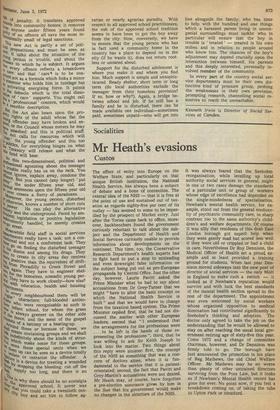Socialities
Mr Heath's evasions custos
The effect of entry into Europe on the Welfare State, and particularly on that unique British institution, the National Health Service, has always been a subject of debate and a bone of contention. The central idea of the NHS — that it is free at the point of use and sustained out of taxation as regards eighty-five per cent of its outlay — has seemed to some to be imperilled by the prospect of Market entry. Just after the Tories came back to office, moreover, backbenchers found the government curiously reluctant to talk about the subject and the Department of Health and Social Services curiously unable to provide information about developments on the continent. This time, too, the Conservative Research Department's health experts had to fight hard to put a stop to misleading and even downright false information on the subject being put out as pro-European propaganda by Central Office. Just the other day, however, Laurie Pavitt asked the Prime Minister what he had to say about accusations from Dr Grey-Turner that we might "have to alter the basic concept on which the National Health Service is built" and that we would have to change from the taxation based system. The Prime Minister replied first, that he had not discussed the matter with other European leaders; second that "I understood that the arrangements for the professions were ... to be left in the hands of those representing the professions "; third, that he was willing to ask Sir Keith Joseph to look into the matter. Two things about this reply were sinister: first, the concept of the NHS as something that was a concern of doctors alone, when it is fundamental to the service that it is patientorientated; second, the fact that Pavitt and Grey-Martin's accusations were not denied. Mr Heath may, of course, have forgotten a pre-election assurance given by him in the Sun that his government would make no changes in the structure of the NHS. It was always feared that the Seebohm reorganisation, while levelling up local authority social services in general, might in one or two cases damage the standards of a particular unit or group of workers whose edge of excellence had depended on the single-mindedness of specialisation. Newham's mental health service, for example, stood out from the general mediocrity of psychiatric community care, in sharp contrast too to the same authority's childdren's and welfare departments. Of course it was silly that residents of this drab East London borough got superb help when they went gently mad but scored less well if they were old or crippled or had a child in care. Nevertheless Dr Roy Dennison, the Medical Officer of Health set a proud, example and at least provided a training ground for students. When last year Dennison moved sideways into the new post of director of social services — the only MoH in England to make such a switch — it looked as if Newham's reputation would survive and with luck the best standards of the mental health section spread to the rest of the department. The appointment was even welcomed by social workers whose organised opposition to medical domination had contributed significantly to Seebohm's thinking and adoption. The doctor only agreed to take the job on the understanding that he would be allowed to stay on after reaching the usual local government retiring age of sixty-five this year.
Come 1972 and a change of committee chairman, however, and Dr Dennison was firmly told to go. The borough have just announced the promotion in his place of Reg Mathews, the old Chief Welfare Officer. Mr Mathews may be no worse than plenty of other untrained directors surviving from the Poor Law, but it looks as if Newham's Mental Health record has gone for ever. No point now, if you feel a breakdown coming on, of taking the tube to Upton Park or Stratford.












































 Previous page
Previous page